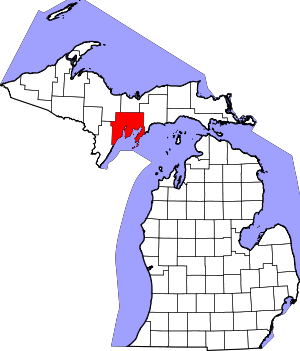Escanaba, Michigan
Escanaba (/ˌɛskəˈnɑːbə/ ES-kə-NAH-bə) is a port city in Delta County in the U.S. state of Michigan, located on Little Bay de Noc in the state's Upper Peninsula. The population was 12,616 at the 2010 census, making it the third-largest city in the Upper Peninsula after Marquette and Sault Ste. Marie. It is the seat of government of Delta County.[6]
Escanaba, Michigan | |
|---|---|
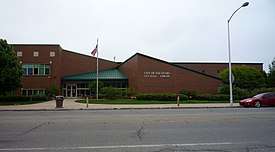 Escanaba City Hall and Library | |
| Nickname(s): Esky | |
| Motto(s): Live Laugh Learn | |
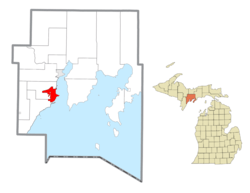 Location within Delta County | |
 Escanaba Location within the state of Michigan | |
| Coordinates: 45°44′43″N 87°03′52″W | |
| Country | United States |
| State | Michigan |
| County | Delta |
| Incorporated | 1866 (village) 1883 (city) |
| Government | |
| • Type | Mayor–council |
| • Mayor | Marc Tall |
| Area | |
| • Total | 16.37 sq mi (42.39 km2) |
| • Land | 12.74 sq mi (33.01 km2) |
| • Water | 3.62 sq mi (9.38 km2) |
| Elevation | 607 ft (183 m) |
| Population | |
| • Total | 12,616 |
| • Estimate (2019)[3] | 12,160 |
| • Density | 954.10/sq mi (368.38/km2) |
| Time zone | UTC−5 (EST) |
| • Summer (DST) | UTC−4 (EDT) |
| ZIP Codes | 49829, 49894 |
| Area code(s) | 906 |
| FIPS code | 26-26360[4] |
| GNIS feature ID | 1619865[5] |
| Website | Official website |
There is also Escanaba Township, which is north of the city and is not adjacent to it, although a portion of the urban area around the city extends into the township. Both are named for the Escanaba River, which flows into the Little Bay de Noc of Lake Michigan just north of the city at 45°46′37″N 87°03′30″W. The names are derived from the Ojibwa language.[7][8]
History
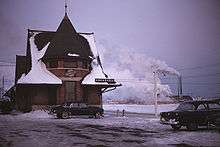
Escanaba was the name of an Ojibwa village in this area in the early 19th century.[9] The Ojibwa are one of the Anishinaabe, Algonquian-speaking tribes who settled and flourished around the Great Lakes. The word "Escanaba" roughly translates from Ojibwe and other regional Algonquian languages to "land of the red buck", although some people maintain that it refers to "flat rock".
As a European-American settlement, Escanaba was founded in 1863 as a port town by surveyor Eli P. Royce. Early industry was the processing and harvesting of lumber, dominated in this area by Daniel Wells Jr., Jefferson Sinclair, and Nelson Ludington. Ludington later moved his headquarters to Chicago, where he also entered banking. I. Stephenson established a successor lumber company in the area and also became a capitalist.
Before the war, iron ore was being mined from the Marquette Range, which shipped out on barges from Escanaba.[10] By the time of the American Civil War, this port was important to the Union as a shipping point for these ores, in addition to lumber.[11] The Menominee Range and Gogebic Range of Michigan became important for iron ore after the war, in the 1880s.[12] Michigan still produces about 25% of the iron ore nationally.[13] Initially lumber was still integral to shipbuilding, and supported the construction of houses in cities throughout the developing Midwest. Iron ore supported industrialization, and became part of steel and other industries in the Midwest.[11] As shipping increased, a lighthouse was needed to warn of a sand shoals in Little Bay de Noc, which extended from Sand Point, a sandspit located just south of and adjacent to the harbor area.[14] The United States Lighthouse Service approved construction of the Sand Point Lighthouse at a cost of $11,000.[15] Construction began in the fall of 1867 and was completed in early spring 1868.[15]
Present day
Until 2017, Escanaba continued to serve as an important shipping point for iron ore to other Great Lakes ports, especially south to Chicago and northern Indiana.[10][11][8] The local paper mill, for many years owned by Mead Corporation's Publishing Paper Division, is currently operated by Verso Corporation.[16] Located on the outskirts of the city alongside the Escanaba River, it is now Escanaba's largest employer.[17]
Geography
According to the United States Census Bureau, the city has a total area of 16.50 square miles (42.73 km2), of which 12.88 square miles (33.36 km2) is land and 3.62 square miles (9.38 km2) is water.[18][19]
Climate
This climatic region is classified as humid continental climate, abbreviated "Dfb", according to the Köppen-Geiger climate classification.[20] It is typified by large seasonal temperature differences, with warm to hot (and often humid) summers and cold (sometimes severely cold) winters. Escanaba is described as being in the banana belt of Michigan's Upper Peninsula. While most of the peninsula is affected by significant lake-effect snow, Escanaba's winter climate is much milder due to its location on the leeward Lake Michigan shoreline.
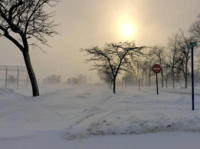 Winter weather displayed near Ludington Park in Escanaba.
Winter weather displayed near Ludington Park in Escanaba.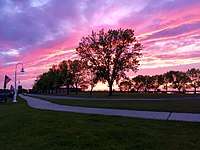 A sunset during the summer, as seen from Water Plant Road.
A sunset during the summer, as seen from Water Plant Road.
| Climate data for Escanaba, Michigan (1981–2010 normals, extremes 1948–present) | |||||||||||||
|---|---|---|---|---|---|---|---|---|---|---|---|---|---|
| Month | Jan | Feb | Mar | Apr | May | Jun | Jul | Aug | Sep | Oct | Nov | Dec | Year |
| Record high °F (°C) | 55 (13) |
52 (11) |
70 (21) |
84 (29) |
91 (33) |
98 (37) |
99 (37) |
100 (38) |
96 (36) |
82 (28) |
71 (22) |
58 (14) |
100 (38) |
| Average high °F (°C) | 26.4 (−3.1) |
28.5 (−1.9) |
36.4 (2.4) |
47.9 (8.8) |
60.1 (15.6) |
70.3 (21.3) |
76.0 (24.4) |
75.4 (24.1) |
67.6 (19.8) |
55.0 (12.8) |
42.4 (5.8) |
31.1 (−0.5) |
51.4 (10.8) |
| Daily mean °F (°C) | 16.2 (−8.8) |
17.6 (−8.0) |
26.0 (−3.3) |
38.3 (3.5) |
50.1 (10.1) |
60.0 (15.6) |
65.6 (18.7) |
65.3 (18.5) |
57.2 (14.0) |
45.7 (7.6) |
33.8 (1.0) |
22.1 (−5.5) |
41.5 (5.3) |
| Average low °F (°C) | 6.0 (−14.4) |
6.7 (−14.1) |
15.5 (−9.2) |
28.7 (−1.8) |
40.1 (4.5) |
49.7 (9.8) |
55.1 (12.8) |
55.1 (12.8) |
46.9 (8.3) |
36.3 (2.4) |
25.2 (−3.8) |
13.1 (−10.5) |
31.5 (−0.3) |
| Record low °F (°C) | −28 (−33) |
−30 (−34) |
−26 (−32) |
−1 (−18) |
23 (−5) |
30 (−1) |
38 (3) |
38 (3) |
25 (−4) |
19 (−7) |
−7 (−22) |
−23 (−31) |
−30 (−34) |
| Average precipitation inches (mm) | 1.06 (27) |
0.92 (23) |
1.77 (45) |
2.23 (57) |
2.94 (75) |
2.98 (76) |
3.37 (86) |
3.35 (85) |
3.20 (81) |
2.96 (75) |
2.45 (62) |
1.44 (37) |
28.67 (728) |
| Average snowfall inches (cm) | 13.1 (33) |
7.9 (20) |
9.5 (24) |
2.7 (6.9) |
0.1 (0.25) |
0.0 (0.0) |
0.0 (0.0) |
0.0 (0.0) |
0.0 (0.0) |
— | 4.4 (11) |
11.8 (30) |
49.5 (126) |
| Average precipitation days (≥ 0.01 in) | 9.3 | 6.5 | 7.9 | 9.5 | 10.5 | 11.7 | 9.9 | 10.5 | 10.9 | 11.7 | 9.4 | 10.0 | 117.8 |
| Average snowy days (≥ 0.1 in) | 7.0 | 4.2 | 3.5 | 1.0 | 0.0 | 0.0 | 0.0 | 0.0 | 0.0 | 0.1 | 2.5 | 5.4 | 23.7 |
| Source: NOAA[21][22] | |||||||||||||
Demographics
| Historical population | |||
|---|---|---|---|
| Census | Pop. | %± | |
| 1880 | 3,026 | — | |
| 1890 | 6,808 | 125.0% | |
| 1900 | 9,549 | 40.3% | |
| 1910 | 13,194 | 38.2% | |
| 1920 | 13,103 | −0.7% | |
| 1930 | 14,524 | 10.8% | |
| 1940 | 14,830 | 2.1% | |
| 1950 | 15,170 | 2.3% | |
| 1960 | 15,391 | 1.5% | |
| 1970 | 15,368 | −0.1% | |
| 1980 | 14,355 | −6.6% | |
| 1990 | 13,659 | −4.8% | |
| 2000 | 13,140 | −3.8% | |
| 2010 | 12,616 | −4.0% | |
| Est. 2019 | 12,160 | [3] | −3.6% |
| U.S. Decennial Census[23] | |||
2010 census
As of the census[2] of 2010, there were 12,616 people, 5,622 households, and 3,090 families residing in the city. The population density was 979.5 inhabitants per square mile (378.2/km2). There were 6,178 housing units at an average density of 479.7 per square mile (185.2/km2). The racial makeup of the city was 93.5% White, 0.4% African American, 2.6% Native American, 0.6% Asian, 0.3% from other races, and 2.7% from two or more races. Hispanic or Latino of any race were 1.2% of the population.
There were 5,622 households, of which 26.1% had children under the age of 18 living with them, 36.8% were married couples living together, 13.6% had a female householder with no husband present, 4.6% had a male householder with no wife present, and 45.0% were non-families. Of all households 38.2% were made up of individuals, and 17.6% had someone living alone who was 65 years of age or older. The average household size was 2.14 and the average family size was 2.82.
The median age in the city was 41.4 years. 21.4% of residents were under the age of 18; 9.9% were between the ages of 18 and 24; 22.6% were from 25 to 44; 26.4% were from 45 to 64; and 19.6% were 65 years of age or older. The gender makeup of the city was 47.1% male and 52.9% female.
2000 census
As of the census[4] of 2000, there were 13,140 people, 5,800 households, and 3,294 families residing in the city. The population density was 1,038.3 inhabitants per square mile (400.7/km2). There were 6,258 housing units at an average density of 494.5 per square mile (190.9/km2). The racial makeup of the city was 95.66% White, 0.11% African American, 2.61% Native American, 0.33% Asian, 0.02% Pacific Islander, 0.18% from other races, and 1.09% from two or more races. Hispanic or Latino of any race were 0.66% of the population. 17.0% were of German, 16.5% French, 11.4% French Canadian, 8.8% Swedish, 6.4% Irish and 5.2% English ancestry, according to Census 2000.
There were 5,800 households, out of which 26.6% had children under the age of 18 living with them, 42.2% were married couples living together, 11.2% had a female householder with no husband present, and 43.2% were non-families. Of all households 37.0% were made up of individuals, and 18.1% had someone living alone who was 65 years of age or older. The average household size was 2.19 and the average family size was 2.88.
In the city, the population was spread out, with 22.5% under the age of 18, 9.8% from 18 to 24, 25.1% from 25 to 44, 21.2% from 45 to 64, and 21.4% who were 65 years of age or older. The median age was 40 years. For every 100 females, there were 87.7 males. For every 100 females age 18 and over, there were 82.3 males.
The median income for a household in the city was $29,125, and the median income for a family was $36,995. Males had a median income of $32,310 versus $21,204 for females. The per capita income for the city was $17,589. About 10.8% of families and 13.8% of the population were below the poverty line, including 17.7% of those under age 18 and 9.0% of those age 65 or over.
Culture and contemporary life
In his poem The Song of Hiawatha, Henry Wadsworth Longfellow described how Hiawatha "crossed the rushing Esconaba", referring to the river. Although the Upper Peninsula is part of the state of Michigan, Escanaba and the western Upper Peninsula sometimes have closer cultural ties to the state of Wisconsin.
Yooper culture
Pasties are a significant tourist attraction, and have a particularly unusual history.[24] Many ethnic groups adopted the pasty for use in the Copper Country copper mines; the Finnish immigrants within the region mistook it for the traditional piiraat and kuuko pastries.[25][26] The pasty has become strongly associated with all cultures in this area.[27]
Theater and performing arts
Escanaba is home to the William Bonifas Fine Arts Center, The Waterfront Art Festival, The Players de Noc, The Bay de Noc Choral Society, the Escanaba City Band, and many smaller arts organizations, art galleries, and musical performing groups.[28][29][30][31]
Tourism
Escanaba is home to one the safest natural harbors in the upper Great Lakes, which makes it a natural destination for boaters.[32] Tourism has become significant for the local economy. Tourist draws include Lake Michigan beaches and local fishing and hunting opportunities. Most visitors come from Wisconsin and Illinois.
Shopping and dining
The Delta Plaza Mall, is a small enclosed shopping mall in Escanaba, which features Hobby Lobby, Marshalls, and Dunham's as its anchor stores. Other big box retail stores in Escanaba include, Wal-Mart, Menards, Meijer, Aldi, Walgreens, and Tractor Supply Company. The downtown district features many small, locally owned retail stores. Viau's Market and Kobosic's Market are small grocery stores that feature on-site butchers. Eateries include: Stone Cup Coffee House & Deli, Ferdinand's, Crispigna's, Hong Kong Buffet, Hereford and Hops, Swedish Pantry, Rosy's Diner, The Stone House, and The Ludington Grill. Other notable restaurants that are outside the downtown district include The Buck Inn, Family Inn, Drifter's Restaurant, Hudson's Grill, and Thai Express.
Parks and recreation
Parks
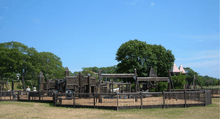
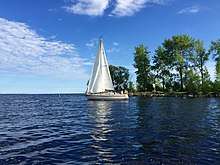
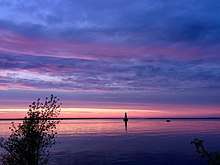
- Ludington Park: A three-quarter mile stretch of lake shore where the city's easternmost point extends into Little Bay de Noc, it is one of the largest city parks in Upper Michigan. Karas Band Shell is located on the south end of the park and it is where concerts are hosted during the summer. A veterans memorial is located in the center of the park. At the north end of the park (across from municipal marina) there is a scenic gazebo and fountain.[33]
- Harbor Hideout: Located within Ludington Park, the 22,500 square foot playground is constructed of wood and features handicap accessible play areas.[34]
- Kiwanis Musical Playground: In June, 2018, the Escanaba Kiwanis installed a new handicap accessible musical play area next to harbor hideout. The equipment that was installed included a metallophone, a set of chimes, a kettle drum, and a goblet drum. All of the new equipment installed is ADA compliant.[35]
Boating and beaches
- Escanaba yacht club: Established in 1934, it hosts several races and events for members during the summer.[33]
- Escanaba Municipal Beach: located on Aronson Island, is open from early June to mid-August. The beach-house includes a changing facility with restrooms and showers. In addition, there is also a small playground and picnic area available for public use. The beach house usually has paddleboards and kayaks available for renting.[33]
- Aronson Island Boat Launch: In order to use the boat launch a day-pass or seasonal permit is needed prior to launching a boat. The launch has a weight restriction of 6,000 pounds and a length restriction of 26 feet, if a boat exceeds this, a special permit must be obtained from the harbormaster.[33]
- North Shore Boat Launch: located on the Escanaba River.
Places of interest
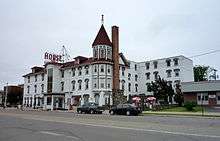
- The House of Ludington - A landmark historic hotel in downtown Escanaba.[36][8] Originally built in 1865 as the Gaynor House Hotel, it was renamed in 1871 after prominent lumberman Nelson Ludington.[36] It was rebuilt as a brick structure in the Queen Anne Style in 1883, becoming the New Ludington Hotel. It is believed that Al Capone utilized the tunnels located below the basement of the hotel during the prohibition era.[37]
- Sand Point Lighthouse & Delta County Historical Museum - Deactivated in 1939, this lighthouse was used by the United States Coast Guard to house seamen assigned to Escanaba.[15] The building was completely restored to its original design in the late 1860s, and has been listed on the National Register of Historic Places, along with Escanaba's central downtown district.[15]
- U.P. Steam & Gas Engine Museum[38]
- Carnegie Public Library (Escanaba Public Library)[39]
- Hiawatha National Forest
- Days River Pathway or Days River Nature Pathway[33]
- Escanaba Farmer's Market[33]
Laws and government
Government
Escanaba is in Congressional District 1; its Representative since 2017 in Congress is Jack Bergman (R).
Police and corrections
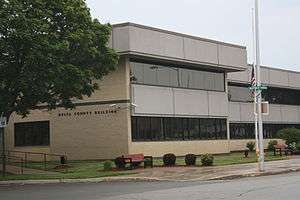
The Delta County Sheriff's Office along with Escanaba Public Safety, and the Michigan State Police, collaborate with other police agencies in neighboring counties to make up the Upper Peninsula Substance Enforcement Team (UPSET). UPSET utilizes investigators, informants, K-9 units, and other resources to perform clandestine operations to arrest those involved with drug use, distribution and sale across the Upper Peninsula.[40][41] UPSET is the only federally trained and certified clandestine lab team in the Upper Peninsula.[40] The Delta County Jail is an 85-bed facility that employs 13 full-time correction officers, under the supervision of Lt. Jason Thibeault.[42] In September 2017, Delta County secured a $17.9 million loan for the construction of a new jail.[43] The new two story jail will be capable of housing 160 beds.[44]
Courts
The Delta County Courthouse serves all of Delta County. The courthouse includes the 47th Circuit Court, the 94th District Court, and Probate Court.[45]
Education
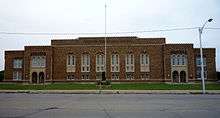
In 2003, the school board opted to completely renovate the historic 1930's junior high school, rather than move it outside of town.[46][47] Escanaba Area Public Schools operate the public schools in Escanaba, which includes various elementary schools, the middle school, and high school. There is also a private school, Holy Name Catholic School, which teaches pre-school children all the way up to eighth grade. Bay College, a public 2-year college, was founded in the city in 1962.[48] It offers various two year degrees and certificate programs ranging from welding, public safety, business, nursing, among others.
Media
Local radio stations include KMB Broadcasting's WDBC 680 AM (adult standards) and WYKX 104.7 FM (country music), Lakes Radio's WCHT 600 AM (news/talk), WGLQ 97.1 FM (adult top 40), WCMM 102.5 FM (country), and WGKL 105.5 FM (oldies), and standalone WUPF 107.3 FM (classic hits). Escanaba is also served by low-power translator stations of WNMU translator W296AX from Marquette, MI (at 96.5 FM), WRPP translator W254AG from Sturgeon Bay, WI (at 98.7 FM), and WHWL translator W261AI from Marquette, MI (at 100.1 FM). WJMN-TV, the local television station on channel 3, is mostly a satellite of WFRV in Green Bay and carries CBS programming. WLUC-TV in Marquette also operates a translator station in Escanaba on channel 14.
- In January 1968, Green Bay Packers coach Vince Lombardi's daughter was married in Escanaba at St. Anne's Church. Upon learning that his then-unwed daughter was pregnant, Lombardi, who was vacationing in Florida at the time, insisted she drive to Michigan to get married rather than having her marriage in Green Bay, to prevent her news from being reported in the papers.[49]
- The film, Escanaba in da Moonlight is a satirical film that depicts what it's like to experience yooper 'deer camp'.
Infrastructure
Escanaba's Harbor Tower, an 18-story apartment building, is the tallest building in Michigan's Upper Peninsula.[50]
Transportation




Airport
- The city is served by Delta County Airport (KESC), with daily flights to Detroit via Delta Connection.[51]
Buses
- Indian Trails provides daily intercity bus service between St. Ignace and Ironwood, Michigan[52] and between Hancock, Michigan and Milwaukee, Wisconsin[53]
Notable people
- Tom Bissell, author and Guggenheim Fellow
- Kevin Chown, American bass player most notable for his work with Chad Smith of Red Hot Chili Peppers, and Tarja Turunen, Finnish soprano artist.[54]
- Fahey Flynn, television news reader
- Karla M. Gray, Montana's first female chief justice
- Becky Iverson, professional golfer
- Nelson Ludington, settler who named the city
- Eli Parsons Royce, founder of city
- "Roaring Dan" Seavey, Great Lakes pirate
- Kevin Tapani, baseball player
- Chauncey W. Yockey, Wisconsin State Assemblyman.[55]
Image gallery
 Harbor Tower, the Upper Peninsula's tallest building
Harbor Tower, the Upper Peninsula's tallest building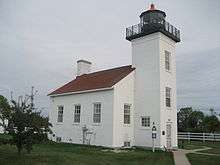 The Sand Point Lighthouse is on the National Register of Historic Places.
The Sand Point Lighthouse is on the National Register of Historic Places.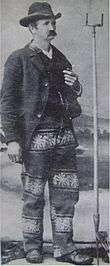 Surveyor Eli P. Royce founded the city of Escanaba
Surveyor Eli P. Royce founded the city of Escanaba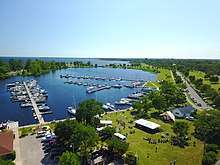 Aerial view of Escanaba's Ludington Park
Aerial view of Escanaba's Ludington Park Ore freighter Arthur M. Anderson departing the Escanaba harbor
Ore freighter Arthur M. Anderson departing the Escanaba harbor
See also
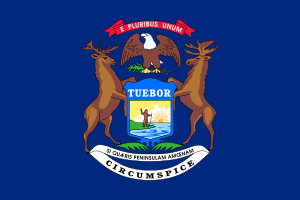
References
- "2019 U.S. Gazetteer Files". United States Census Bureau. Retrieved July 25, 2020.
- "U.S. Census website". United States Census Bureau. Retrieved 2012-11-25.
- "Population and Housing Unit Estimates". United States Census Bureau. May 24, 2020. Retrieved May 27, 2020.
- "U.S. Census website". United States Census Bureau. Retrieved 2008-01-31.
- "US Board on Geographic Names". United States Geological Survey. 2007-10-25. Retrieved 2008-01-31.
- "Find a County". National Association of Counties. Archived from the original on 2011-05-31. Retrieved 2011-06-07.
- "Escanaba Michigan History". Retrieved 2018-03-19.
- "Escanaba | Michigan, United States". Encyclopædia Britannica. Retrieved 2018-03-19.
- Tanner, Helen Hornbeck; Adele Hast; Jacqueline Peterson; Robert J. Surtees; Miklos Pinther (1987). Atlas of Great Lakes Indian History. University of Oklahoma Press. pp. 131, 144. ISBN 0-8061-2056-8.
- Roelofs, Ted (18 February 2016). "Mining's last stand? A UP way of life is threatened". MLive.com. Bridge Magazine. Retrieved 2018-03-19.
- Schaetzl, Randall. "IRON MINING: WHERE AND WHY?". geo.msu.edu. Retrieved 2018-03-19.
- Wood, Vivian. "Fayette Historic Townsite". www.exploringthenorth.com. Retrieved 2018-03-19.
- "Mining's last stand? A UP way of life is threatened". MLive.com. Retrieved 2018-06-29.
- Wood, Vivian. "Sand Point Lighthouse". www.exploringthenorth.com. Retrieved 2018-03-19.
- Delta County, Historical Society. "Sand Point Lighthouse". www.deltahistorical.org. Retrieved 2018-03-19.
- "The Escanaba Mill at-a-glace" (PDF). www.versoco.com. 2016. Retrieved 2018-03-19.
- "Top Employers". www.deltaeda.org. Delta County Economic Development Alliance. Retrieved 2018-03-19.
- "US Gazetteer files 2010". United States Census Bureau. Archived from the original on 2012-01-25. Retrieved 2012-11-25.
- "U.S. Census Bureau QuickFacts: Escanaba city, Michigan". www.census.gov. Retrieved 2018-03-19.
- "Escanaba, Michigan Köppen Climate Classification (Weatherbase)". Weatherbase.
- "NowData - NOAA Online Weather Data". National Oceanic and Atmospheric Administration. Retrieved July 29, 2016.
- "MI Escanaba". National Oceanic and Atmospheric Administration. Retrieved July 29, 2016.
- "Census of Population and Housing". Census.gov. Retrieved June 4, 2015.
- Silver, Kate (7 March 2014). "Prowling for pasties in the U.P." Chicago Tribune.
- Ojakangas, B. (1988). The Great Scandinavian Baking Book. Boston: Little, Brown, p. 308.
- "History of the Pasty". Houghton, Michigan: Michigan Technological University. Retrieved 21 December 2012.
- Shortridge, Barbara (1998). The taste of American place. Rowman & Littlefield. pp. 21–36. ISBN 0-8476-8507-1.
- "Escanaba City Band". tripadvisor.ca.
- Choral society gears up for annual Christmas concert (December 4, 2008) Daily Press.
- Affiliate organizations, William Bonifas Fine Arts Center. Archived 2010-08-25 at the Wayback Machine
- "Waterfront Art Festival in Escanaba". miningjournal.net.
- Escanaba Harbor Newsletter.
- "Escanaba, Michigan - Parks, Trails, Historic Spots, Marina & More". www.eyeonmichigan.com. Retrieved 2018-06-29.
- City of Escanaba. "HARBOR HIDEOUT PLAYGROUND" (PDF). Escanaba.org.
- "Escanaba Kiwanis create new musical play area at Ludington Park". Daily Press. Retrieved 2018-06-29.
- Rose-Wils, Karen (21 August 2015). "House of Ludington witnessed Esky history". www.dailypress.net. Escanaba Daily Press. Retrieved 2018-03-19.
- "House of Ludington witnessed Esky history | News, Sports, Jobs - Daily Press". www.dailypress.net. Retrieved 2018-06-29.
- "About the Agricultural Museum – The U.P. Steam and Gas Engine Association". www.upsteamandgasengine.org. Retrieved 2018-06-29.
- "History of the Library | Escanaba Public Library". www.uproc.lib.mi.us. Retrieved 2018-06-29.
- "UPSET | Upper Peninsula Substance Enforcement Team". upsetdrugs.com. Retrieved 2018-06-29.
- "Sheriff's Office – Delta County". deltacountymi.org. Retrieved 2018-06-29.
- "Correctional Facility – Delta County". deltacountymi.org. Retrieved 2018-06-29.
- "County gets loan for jail project | News, Sports, Jobs - Daily Press". www.dailypress.net. Retrieved 2018-06-29.
- "Final plans presented for new jail | News, Sports, Jobs - Daily Press". www.dailypress.net. Retrieved 2018-06-29.
- Michigan.gov. "Delta County Court Directory". courts.mi.gov. Retrieved 2018-06-29.
- Mac McClelland, "More for Your Money" Archived 2011-06-09 at the Wayback Machine, Michigan Land Use Institute, February 22, 2004, Accessed July 15, 2009.
- "Escanaba In Da Daylight : Michigan Land Use Institute". www.mlui.org. Retrieved 2018-06-29.
- "A Rich Tradition of Quality Education". www.baycollege.edu. Bay College. Archived from the original on 2018-06-17. Retrieved 2018-03-19.
- Maraniss, David (1999-10-07). When Pride Still Mattered: A Life of Vince Lombardi. Simon & Schuster. p. 430. ISBN 0-684-84418-4.
- "Harbor Tower, Upper Peninsula's Tallest Building". Yooper Steez.
- "Daily Flight Schedule – Delta County". deltacountymi.org. Retrieved 2018-06-17.
- "ST. IGNACE-SAULT STE. MARIE-IRONWOOD" (PDF). Indian Trails. January 15, 2013. Archived from the original (PDF) on 2014-07-04. Retrieved 2013-02-28.
- "HANCOCK-MARQUETTE-GREEN BAY-MILWAUKEE" (PDF). Indian Trails. January 15, 2013. Archived from the original (PDF) on 2014-02-22. Retrieved 2013-02-28.
- Kevin Chown voter registration
- Wisconsin Blue Book 1911, Biographical Sketch of Chauncey W. Yockey, p. 771
External links
| Wikimedia Commons has media related to Escanaba, Michigan. |
